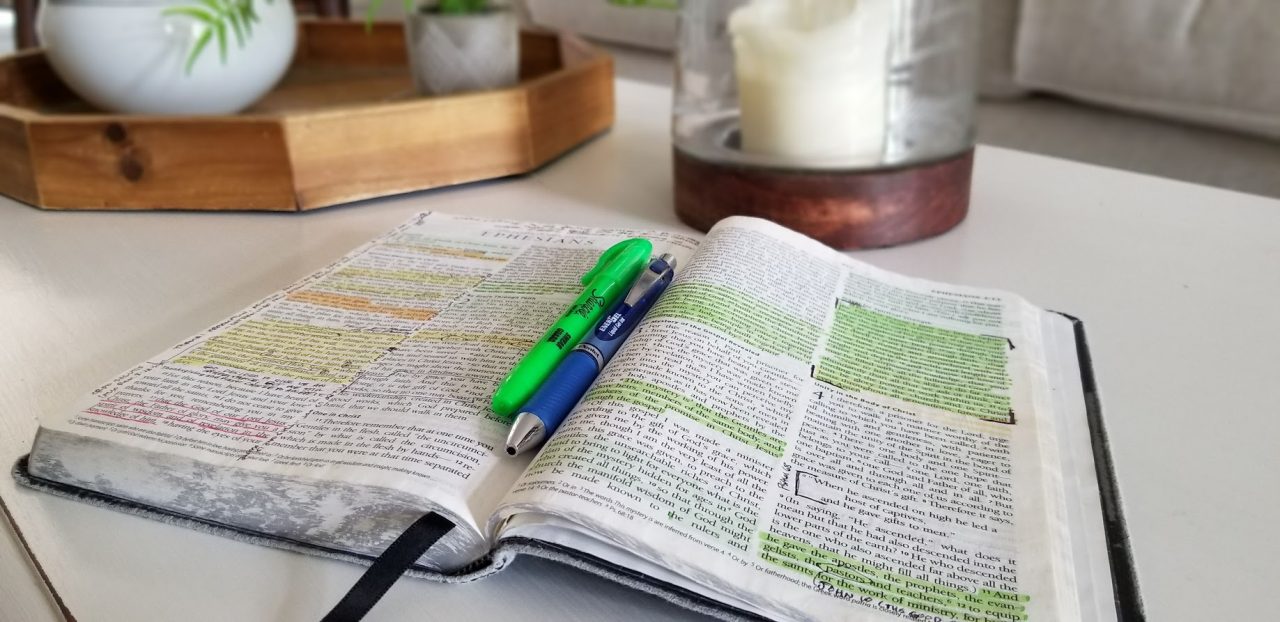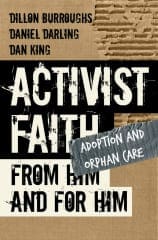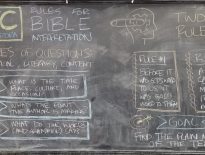When I stepped into my new role as Director of Family Ministries (and youth minister) at St. Edward’s Episcopal Church, one of the biggest things on my heart was to ensure that the children and youth in our church understood how to study the Bible well.
I mean, honestly, is there anything more important for the Christian walk?
And I don’t think that every Christian needs to be a master theologian and Bible interpreter (Lord knows I’m not). But every Christian should have the ability to read, understand, and apply the sacred texts of the Bible to our lives… in ways that change us and conform us into the image of Christ.
That’s why I wanted to do a teaching series with our youth group that would be the foundation of every other conversation we have about the Bible going forward.
why learn how to study the bible?
“Biblical literacy is neither a current reality nor a goal in the U.S.”
– Barna Goup
The fact that Bible literacy isn’t important in our culture is evidenced in practically everything we do. We live in a soundbite society where we judge people based on a 3-second blip of something they said, regardless of the full context. Entire political battles that consume our nation ride on incomplete conversations, rather than people taking the time to sit down, have a conversation, and do the work of trying to understand each other.
And we do the same thing with our Scriptures.
We find a few words that support our (often flawed) way of thinking, and stand on these pebbles as if they were a mountain of truth. Ultimately, we end up on shaky ground that cannot come close to supporting us.
And then we wonder why so many Christian kids fall away from the faith when they leave the nest and go off to college (where they are challenged to think). The reality is that they never stand a chance with such a shaky foundation in the Word.
the complete lesson series
This series on how to study the Bible isn’t mean to be a complete masterclass in theology and/or Bible interpretation. Instead, it’s intended to provide an overview of key concepts that every Christian should know as it related to Scripture reading and application in our lives. Quite honestly, each individual lesson here (originally covered in a 30-45 minute conversation) can be a full semester-long college course. So this is trimmed down substantially to help provide some basic foundation to bring more understanding (and stability) to our work of reading the Bible.
P.S. This isn’t just for youth. Unfortunately many adults don’t know this stuff either. We all need to go back to basics and learn how to better care for the Word and how we use it in our lives. With that, here’s the series.
We start with a basic introduction to the Bible. What are the Scriptures? Where did they come from?
Building on the foundation covered in the introduction, we explore the Old Testament with an overview of the structure and the story line.
a short survey of the old testament (youth ministry lessons)
Moving from the Old Testament, we then do a similar overview of the structure and story line of the New Testament. Understanding this beginning to end flow of the Bible helps us keep the main point in context.
a short survey of the new testament (youth ministry lessons)
Building on our understanding of the texts of the Old and New Testaments, we begin to explore concepts that impact how we read and understand the Bible. And we begin that look with exploring the different types of translations we have for English Bibles.
Going another step deeper, we start to explore how words are used. Recognizing the importance of both the English-translated words we have and read, as well as the original Greek and Hebrew languages (and how we find their meanings).
Finally, we get into the some of the core principles for how we study the meaning of the text and apply it to our lives. These principles are only effective when building on all of the other lessons we covered leading up to this point.
suggested resources for further study
As I’ve mentioned, this series really just scratches the surface. So I also wanted to share a few more resources to help you dig deeper, starting with the e-book version of this content (available on Amazon Kindle)…
And here are some other resources that you’ll find helpful:
- The Book of Common Prayer (for the Episcopal Church)
- Eat This Book: A Conversation In the Art of Spiritual Reading by Eugene H. Peterson
- How To Read the Bible for All Its Worth by Gordon D. Fee and Douglas Stuart
If you have other resources that you like, please share a link to them in the comments section below the post. I’d love to check out the stuff that you’ve found most helpful in your reading/studying of Scripture.
final thoughts on how to study the bible
I think one of the most important elements (that we haven’t discussed much yet) of how to study the Bible is that it works best in community. I find that after building this foundation, the conversations we have in our youth group now are much richer and deeper. I know that I have thoughts and ideas that come up when studying the texts, but there are always other great ideas that come from others I discuss it with. Together, we have greater revelation than we would on our own.
It’s also important to remember that this is something that requires practice. It’s not the kind of thing that you can read over and think, “oh, that was pretty cool to learn.” No. You need to spend time applying these principles. And keep practicing.
And as we all become better stewards of the Word we’ve been given, our lives begin to change. We conform more into the image of Christ. And when we encounter the deep issues we face in the world today, we can come with greater wisdom and grace.
The Lord be with you.





0 Comments